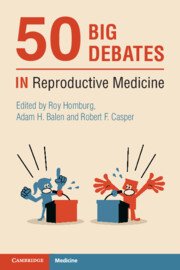Book contents
- 50 Big Debates in Reproductive Medicine
- Series page
- 50 Big Debates in Reproductive Medicine
- Copyright page
- Contents
- Contributors
- Foreword
- Introduction
- Section I Limits for IVF
- Section II IVF Add-ons
- Section III The Best Policy
- Section IV Embryology
- Section V Ethics and Statistics
- Section VI Male-factor Infertility
- Section VII Genetics
- Section VIII Ovarian Stimulation
- Section IX Hormones and the Environment
- 45A Metformin Is an Effective Treatment for Infertility Associated with Anovulatory PCOS
- 45B Metformin Is an Effective Treatment for Infertility Associated with Anovulatory PCOS
- 46A Laparoscopic Ovarian Drilling Should Be Performed for CC-Resistant PCOS
- 46B Laparoscopic Ovarian Drilling Should Be Performed for CC-Resistant PCOS
- 47A Asymptomatic Polycystic Ultrasound Appearance of the Ovary Is Favourable for IVF Outcome
- 47B Asymptomatic Polycystic Ultrasound Appearance of the Ovary Is Favourable for IVF Outcome
- 48A Ultrasound Monitoring Is Not Required for Letrozole Treatment
- 48B Ultrasound Monitoring Is Not Required for Letrozole Treatment
- 49A Progesterone Levels Should Be Measured on the Day of hCG Administration
- 49B Progesterone Levels Should Be Measured on the Day of hCG Administration
- 50A Progesterone Treatment Does Not Help Recurrent Miscarriage Patients
- 50B Progesterone Treatment Does Not Help Recurrent Miscarriage Patients
- 51A The Microbiome Environment Influences IVF Results
- 51B The Microbiome Environment Influences IVF Results
- Index
- References
51A - The Microbiome Environment Influences IVF Results
For
from Section IX - Hormones and the Environment
Published online by Cambridge University Press: 25 November 2021
- 50 Big Debates in Reproductive Medicine
- Series page
- 50 Big Debates in Reproductive Medicine
- Copyright page
- Contents
- Contributors
- Foreword
- Introduction
- Section I Limits for IVF
- Section II IVF Add-ons
- Section III The Best Policy
- Section IV Embryology
- Section V Ethics and Statistics
- Section VI Male-factor Infertility
- Section VII Genetics
- Section VIII Ovarian Stimulation
- Section IX Hormones and the Environment
- 45A Metformin Is an Effective Treatment for Infertility Associated with Anovulatory PCOS
- 45B Metformin Is an Effective Treatment for Infertility Associated with Anovulatory PCOS
- 46A Laparoscopic Ovarian Drilling Should Be Performed for CC-Resistant PCOS
- 46B Laparoscopic Ovarian Drilling Should Be Performed for CC-Resistant PCOS
- 47A Asymptomatic Polycystic Ultrasound Appearance of the Ovary Is Favourable for IVF Outcome
- 47B Asymptomatic Polycystic Ultrasound Appearance of the Ovary Is Favourable for IVF Outcome
- 48A Ultrasound Monitoring Is Not Required for Letrozole Treatment
- 48B Ultrasound Monitoring Is Not Required for Letrozole Treatment
- 49A Progesterone Levels Should Be Measured on the Day of hCG Administration
- 49B Progesterone Levels Should Be Measured on the Day of hCG Administration
- 50A Progesterone Treatment Does Not Help Recurrent Miscarriage Patients
- 50B Progesterone Treatment Does Not Help Recurrent Miscarriage Patients
- 51A The Microbiome Environment Influences IVF Results
- 51B The Microbiome Environment Influences IVF Results
- Index
- References
Summary
Studies have shown that along the female reproductive tract a continuum of a gradually changing and unique microbiome seem to exist of which the microbial abundance decreases from the lower to the upper part of the tract. The reproductive tract harbours different kinds of microbes and include bacteria, viruses and bacteriophages. As the gut microbiome environment regulates homeostasis and metabolism, actively interacts with the local immune system and provides protection against pathogens, such directive roles are also expected from the reproductive microbiome environment. The most dominant reported bacteria of the lower reproductive tract are of the genus Lactobacillus, which is associated with vaginal and reproductive health. The composition of the lower part of the female reproductive system, more importantly, the presence, absence and abundance of specific bacteria, prior to fresh embryo transfer, is associated with and predictive of IVF outcome.
- Type
- Chapter
- Information
- 50 Big Debates in Reproductive Medicine , pp. 265 - 267Publisher: Cambridge University PressPrint publication year: 2021

